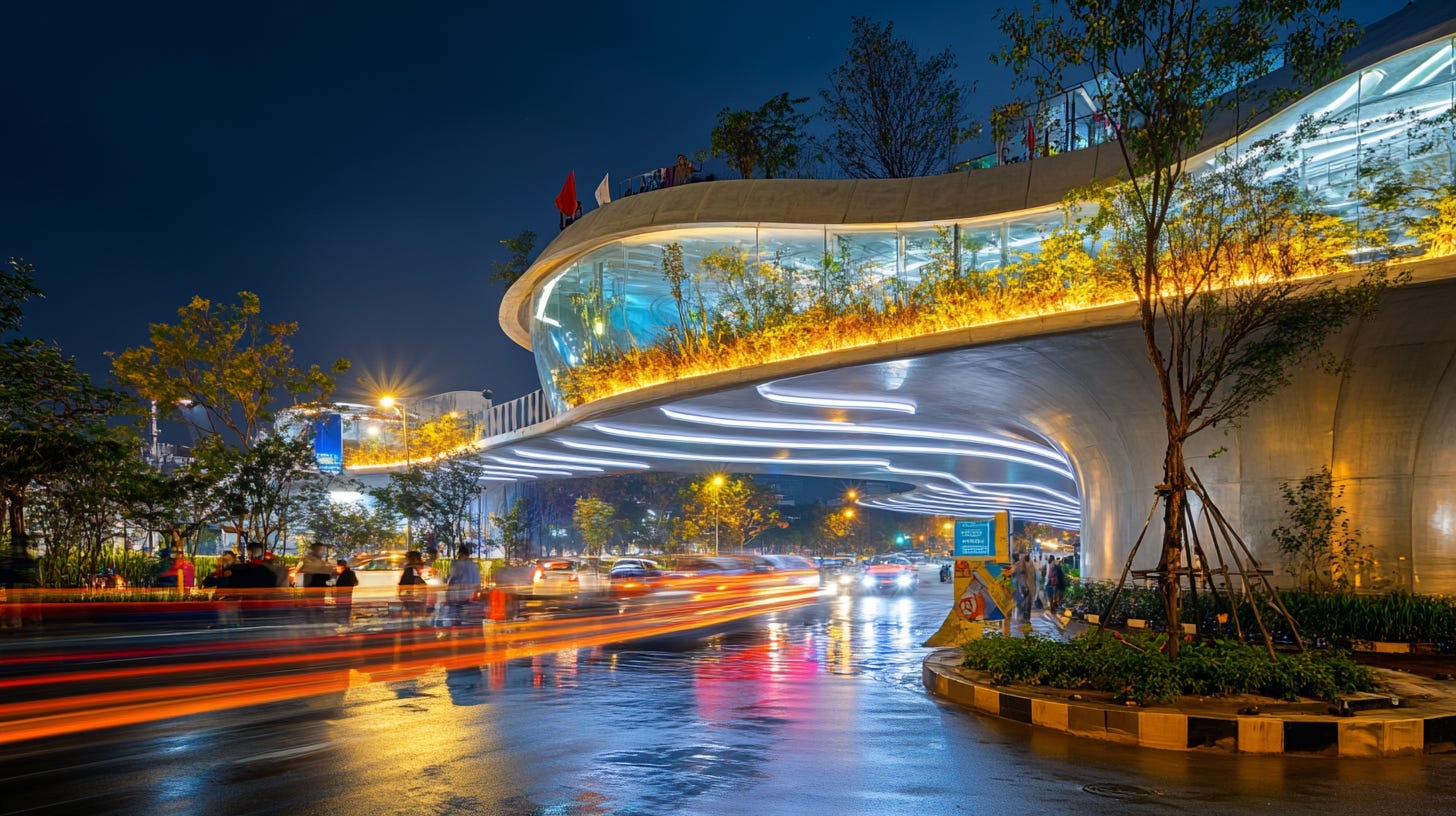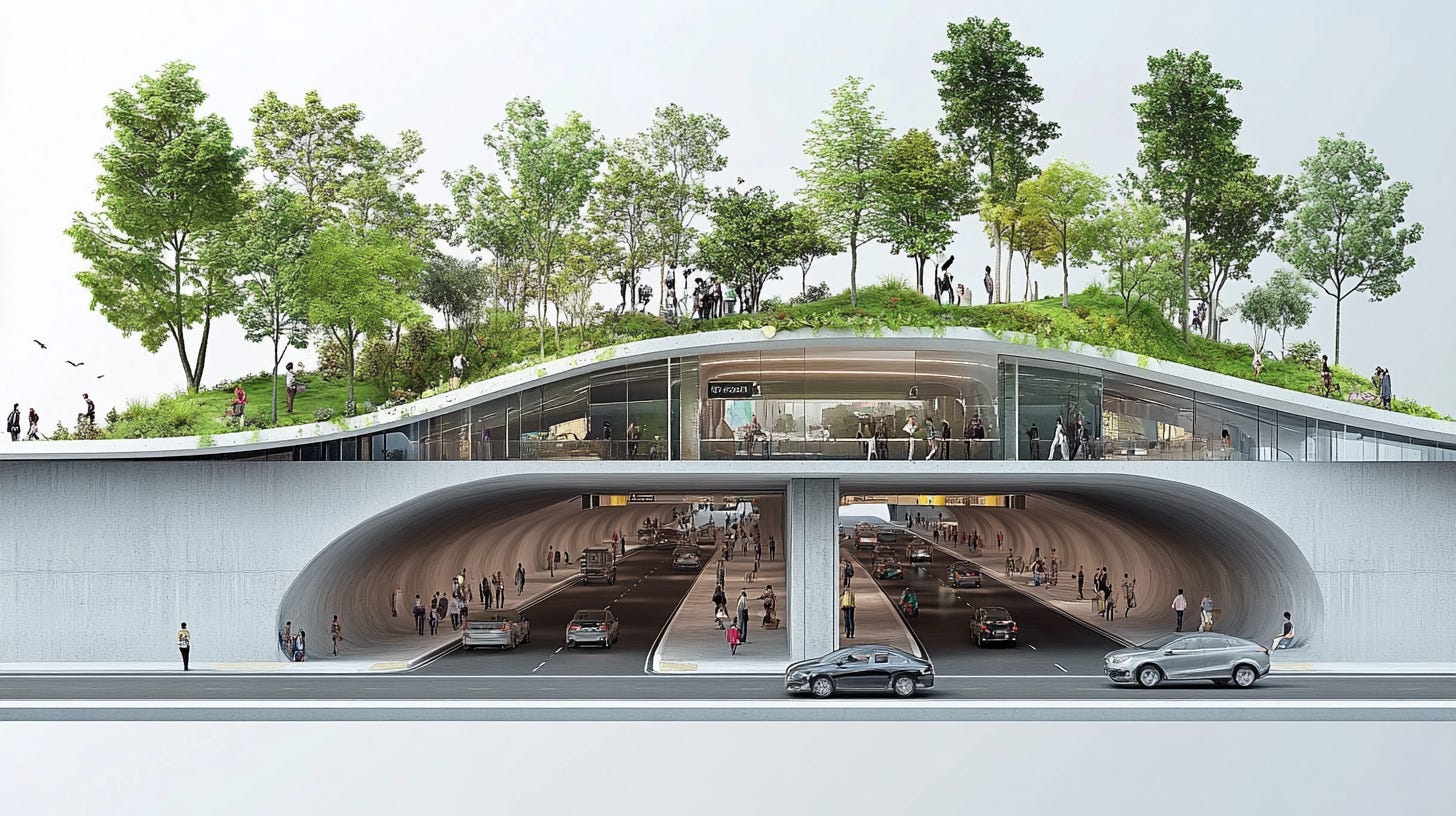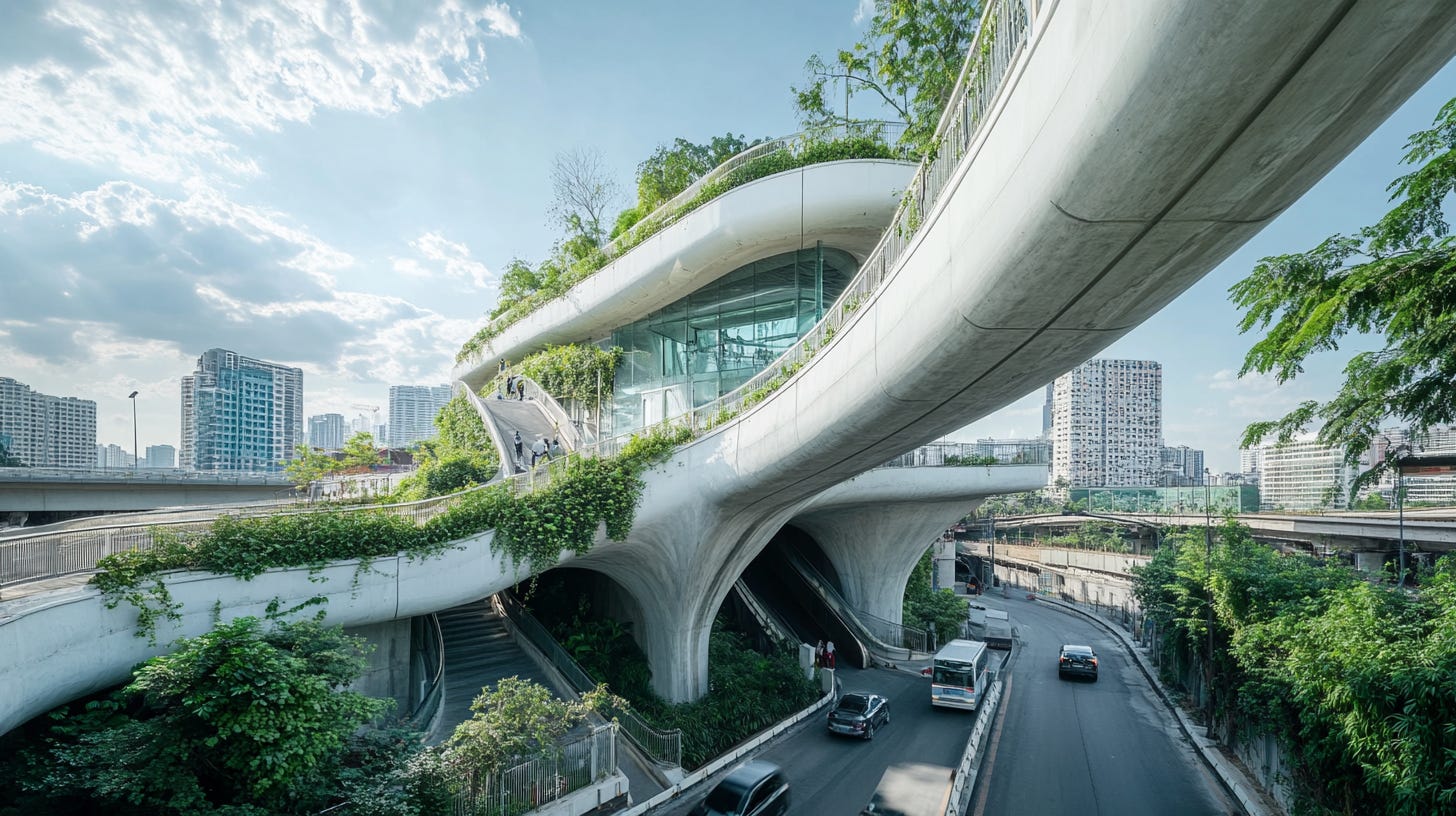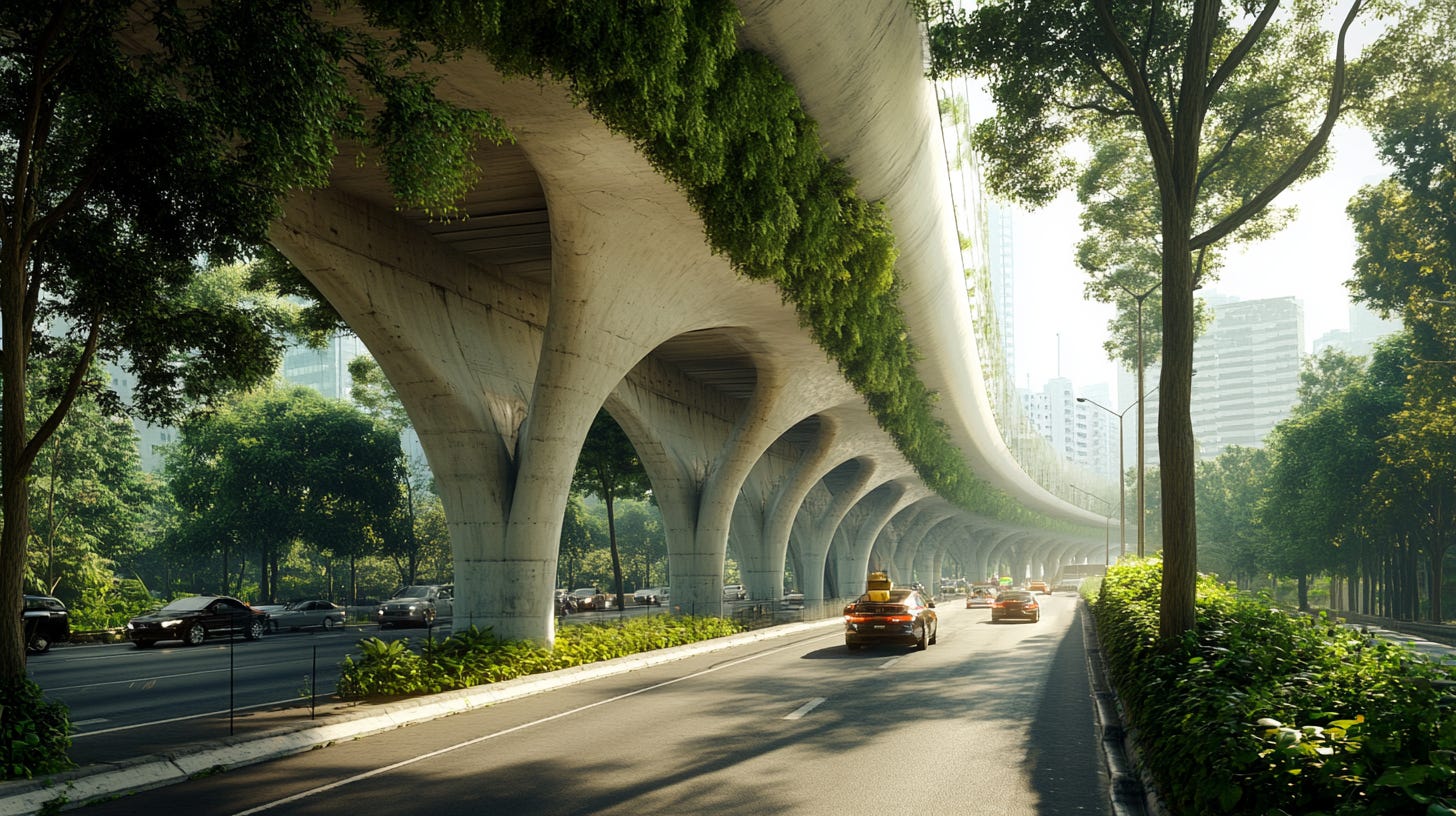The Bangkok Tunnelparks
Infinite Thailand Strategy #1
Bangkok faces two massive infrastructure challenges that have long seemed intractable: its pedestrian-hostile inner-city highways and its critically low ratio of green spaces. The Bangkok Tunnelparks project proposes a single elegant solution to both problems, one that could transform Thailand's capital into one of Asia's most livable cities while generating extraordinary economic returns.
The Twin Problems
Bangkok's inner-city highways—Rama IV, Phetchaburi, Sukhumvit, Ratchadaphisek, and Vibhavadi Rangsit—form concrete barriers that slice through the urban fabric. These elevated roads create dangerous conditions for pedestrians, generate constant noise pollution, and trap heat and emissions at street level. More critically, they divide communities and prevent the organic development of neighborhood life that makes great cities truly livable.
The second challenge is Bangkok's severe deficit of green spaces. With less than 3 square meters of public park space per resident (compared to the World Health Organization's recommendation of 9 square meters), Bangkok ranks among the lowest of major Asian cities in terms of green space accessibility. This shortage affects everything from mental health to urban temperature regulation.
The Tunnelpark Solution
The Bangkok Tunnelparks project proposes to address both challenges through an ambitious but achievable infrastructure program: 30 kilometers of hemispheric tunnels covering the main inner-city highways, topped with continuous linear parks.
Here's what makes the design unique:
30-meter diameter hemispheric tunnels that efficiently manage traffic while creating an iconic architectural form
900,000 square meters of new park space (equivalent to 180 football fields)
Integrated water features for cooling and flood management
Continuous bike and pedestrian paths
Public art installations and cultural spaces
Smart lighting and ventilation systems
The Investment: Breaking Down the Costs
The total cost of the system comes to approximately $7.14 billion USD (245 billion THB), broken down as follows:
Cost per Kilometer:
Tunnel Construction: $140M (58.8%)
Essential Systems: $44M (18.5%)
Park Development: $28M (11.8%)
Supporting Infrastructure: $26M (10.9%)
Total per Kilometer: $238M System Total (30km): $7.14B
While this represents a significant investment, it's actually modest compared to similar urban megaprojects. Boston's Big Dig, for example, cost $24 billion, while Madrid's similar Rio Park project cost $4.5 billion for a smaller scope.
The Returns: A $21 Billion Value Creation
The true genius of the Tunnelparks lies in their ability to generate value far beyond their cost. Conservative estimates suggest the project could create over $21 billion in value through multiple channels:
1. Real Estate Value Appreciation ($12 billion)
20-30% increase in property values adjacent to the parks
10-15% increase within 500m radius
New development opportunities along the 30km corridor
Premium pricing for park-view properties
2. Tourism Revenue Enhancement ($3 billion)
New iconic attraction for urban tourism
Extended average tourist stays
Higher-value tourism segments attracted to improved urban environment
New venues for events and festivals
3. Health and Environmental Benefits ($4 billion)
Reduced healthcare costs from improved air quality
Lower urban cooling costs
Carbon credit generation
Mental health benefits from green space access
4. Commercial Revenue ($2 billion)
Retail and restaurant spaces within the park system
Event space rental
Advertising rights
Parking revenue
The Innovation: GaoGaoGao Blockchain Implementation
The traditional challenge with infrastructure megaprojects is bridging the gap between immediate costs and long-term benefits. The GaoGaoGao blockchain platform offers an innovative solution by creating a transparent, participatory funding mechanism that allows for direct value capture.
How It Works:
Tokenization: The project is divided into tokens representing different value streams:
Infrastructure development rights
Commercial space rights
Revenue sharing agreements
Carbon credit rights
Smart Contracts: Automated contracts ensure transparent fund allocation and benefit distribution
Value Capture: The blockchain platform enables direct capture of:
Real estate appreciation through property investment pools
Operating revenue from commercial spaces
Carbon credit trading
Tourism revenue shares
Implementation Timeline
The project is designed for phased implementation over 11 years:
Phase 1 (Years 1-4)
5km pilot section in central Bangkok
Cost: ~$1 billion
Focus on high-impact central corridors
Phase 2 (Years 4-8)
15km expansion
Cost: ~$3 billion
Connection of major commercial districts
Phase 3 (Years 8-11)
Final 10km completion
Cost: ~$2 billion
Outer ring integration
Beyond the Numbers: A Transformative Vision
While the financial returns are compelling, the true value of the Bangkok Tunnelparks lies in their transformative potential. By solving two of Bangkok's most persistent urban challenges, the project could catalyze a broader urban renaissance:
Creation of new public spaces for community life
Reduction of urban heat island effect
Restoration of street-level community connections
Enhancement of Bangkok's global city brand
Improvement of public health outcomes
Demonstration of innovative infrastructure financing
The Path Forward
The Bangkok Tunnelparks represent more than just an infrastructure project—they're a key component of Thailand's transition to a higher-value economy. By using blockchain technology through the GaoGaoGao platform, we can align the interests of investors, government, and citizens to create extraordinary public value while generating significant returns.
The project's 3:1 return ratio ($21 billion in value creation from $7 billion investment) makes it one of the most compelling infrastructure investments available in Southeast Asia. More importantly, it demonstrates how innovative financing can unlock transformative urban projects that would be difficult to execute through traditional means.
For investors, developers, and city planners worldwide, the Bangkok Tunnelparks offer a new model for infrastructure development—one that creates value for all stakeholders while building the sustainable, livable cities we need for the future.





